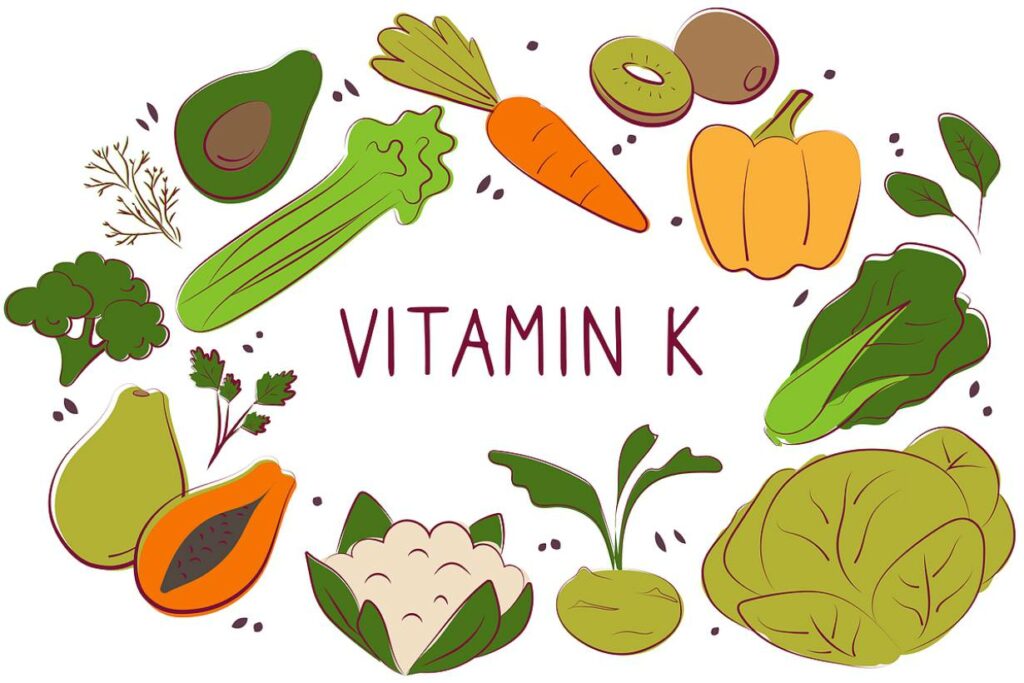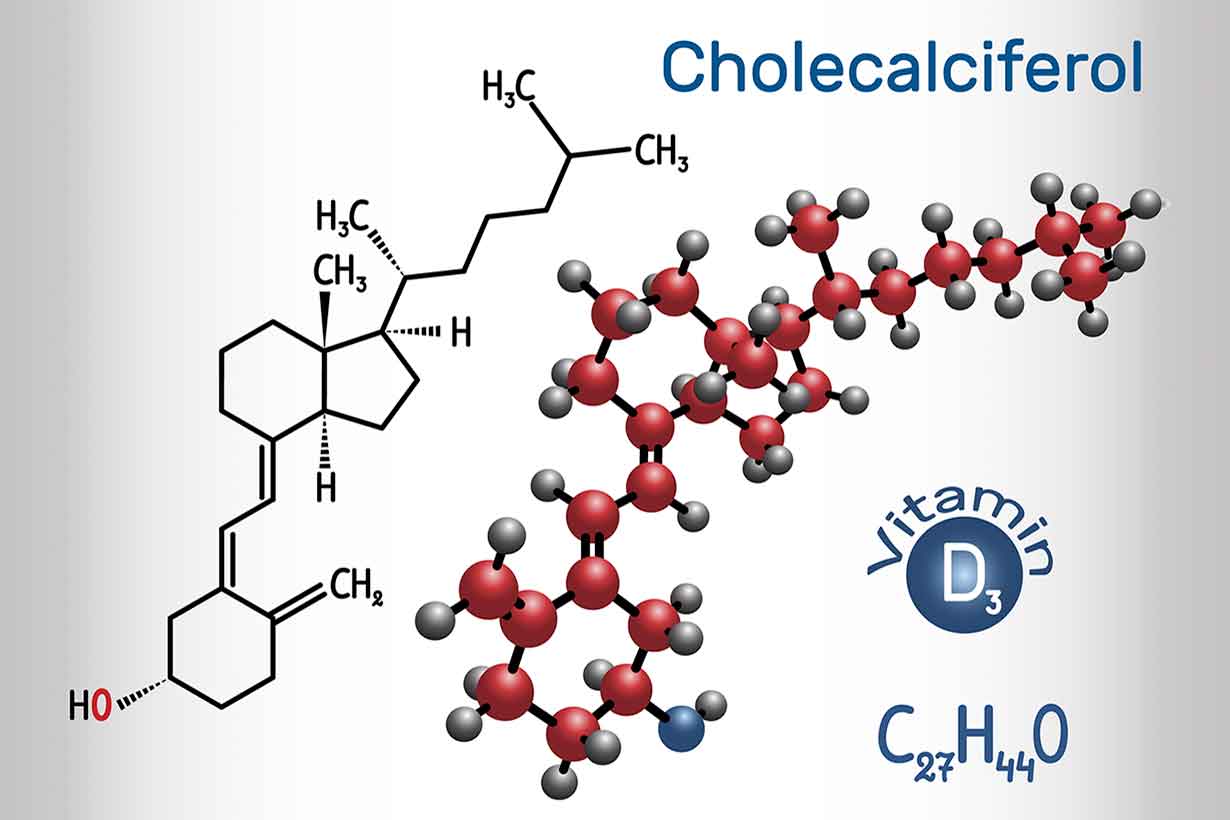30 Foods High In Vitamin K1 (Phylloquinone)
This article will provide a list of foods high in vitamin K1.
Vitamin K is an essential vitamin that we need to obtain from our diet. Alongside vitamin K2, vitamin K1 is one of two forms of the vitamin.
Vitamin K1, also known as phylloquinone, is a fat-soluble vitamin that plays a vital role in bone health and blood clotting (1).
Set by the FDA and based on a 2000-calorie diet, the recommended daily value for total vitamin K intake is 120 mcg daily (2).
Foods high in vitamin K1

The following list shows a list of foods high in vitamin K1 alongside their total K1 content per typical serving and per 100 grams.
The source of nutritional data is the USDA FoodData Central database.
Daily values (% DV) have been calculated using this USDA data against the FDA’s published daily values.
1) Spinach, cooked
| Vitamin K1 per 100 grams | Vitamin K1 per 180g cup |
|---|---|
| 494 mcg (412% DV) | 889 mcg (741% DV) |
Spinach is among the best dietary sources of vitamin K1; a 180-gram cup of cooked spinach provides 741% of the daily value (3).
In addition to vitamin K1, spinach is a good source of other fat-soluble vitamins, including vitamin A and vitamin E.
2) Mustard Greens, cooked
| Vitamin K1 per 100 grams | Vitamin K1 per 140g cup |
|---|---|
| 593 mcg (494% DV) | 830 mcg (692% DV) |
Mustard greens have incredibly high vitamin K1 content. A 140-gram cup serving of cooked mustard greens contains 692% of the daily value (4).
3) Beet Greens, cooked
| Vitamin K1 per 100 grams | Vitamin K1 per 144g cup |
|---|---|
| 484 mcg (403% DV) | 697 mcg (581% DV) |
A 144-gram cup of cooked beet greens provides 697 mcg of vitamin K1, equal to 581% of the daily value (5).
4) Collard Greens, cooked
| Vitamin K1 per 100 grams | Vitamin K1 per 130g cup |
|---|---|
| 469 mcg (391% DV) | 610 mcg (508% DV) |
As shown so far, leafy green vegetables are typically the best dietary sources of vitamin K1, and collard greens are no different.
A 130-gram cup of cooked collard greens has 508% of the daily value for the vitamin (6).
5) Dandelion Greens, cooked
| Vitamin K1 per 100 grams | Vitamin K1 per 105g cup |
|---|---|
| 551 mcg (459% DV) | 579 mcg (483% DV) |
Dandelion greens are an excellent source of vitamin K1, providing 483% of the daily value per 105-gram cup serving (7).
6) Swiss Chard, cooked
| Vitamin K1 per 100 grams | Vitamin K1 per 175g cup |
|---|---|
| 327 mcg 273% DV) | 572 mcg (477% DV) |
Although not relatively as high in vitamin K1 as some other leafy greens, swiss chard still offers a considerable amount of the vitamin.
A 175-gram cup of cooked swiss chard provides 477% of the daily value (8).
7) Kale, cooked
| Vitamin K1 per 100 grams | Vitamin K1 per 118g cup |
|---|---|
| 418 mcg (348% DV) | 493 mcg (411% DV) |
As well as being a good source of vitamin A, kale is an extremely rich source of vitamin K1.
A 118-gram cup of cooked kale offers 411% of the daily value for the vitamin (9).
8) Escarole, cooked
| Vitamin K1 per 100 grams | Vitamin K1 per 150g cup |
|---|---|
| 212 mcg (177% DV) | 318 mcg (265% DV) |
A 150-gram cup of cooked escarole offers 318 mcg of vitamin K1, equal to 265% of the daily value (10).
9) Garden Cress, raw
| Vitamin K1 per 100 grams | Vitamin K1 per 50g cup |
|---|---|
| 542 mcg (452% DV) | 271 mcg (226% DV) |
Just a small amount of raw cress provides high levels of vitamin K1.
A 50-gram cup of cress offers 226% of the daily value (11).
10) Broccoli Raab, cooked
| Vitamin K1 per 100 grams | Vitamin K1 per 85g serving |
|---|---|
| 256 mcg (213% DV) | 218 mcg (182% DV) |
Broccoli raab may not be as popular as regular broccoli but it is just as nutritious.
It is also a rich source of vitamin K1; a three-ounce (85-gram) serving has 182% of the nutrient’s daily value (12).
11) Broccoli, cooked
| Vitamin K1 per 100 grams | Vitamin K1 per 79g half-cup |
|---|---|
| 141 mcg (118% DV) | 110 mcg (92% DV) |
Broccoli is one of the most commonly-consumed vitamin K1 sources.
A 79-gram half-cup serving provides 92% of the daily value (13).
12) Radicchio
| Vitamin K1 per 100 grams | Vitamin K1 per 40g cup |
|---|---|
| 255 mcg (213% DV) | 102 mcg (85% DV) |
Radicchio is a popular salad vegetable often served raw and offers a good amount of vitamin K1.
Each 40-gram cup of shredded raw radicchio provides 85% of the daily value (14).
13) Pesto
| Vitamin K1 per 100 grams | Vitamin K1 per 63g quarter-cup |
|---|---|
| 151 mcg (126% DV) | 95.1 mcg (79% DV) |
Primarily due to its basil content, pesto sauce is a surprisingly good source of vitamin K1.
A 63-gram quarter cup of pesto contains 79% of the daily value (15).
14) Cabbage, cooked
| Vitamin K1 per 100 grams | Vitamin K1 per 75g half-cup |
|---|---|
| 109 mcg (91% DV) | 81.8 mcg (68% DV) |
Cabbage is another common vegetable that provides a good source of vitamin K1.
A 75-gram half-cup serving has 68% of the daily value (16).
15) Pumpkin Leaves, cooked
| Vitamin K1 per 100 grams | Vitamin K1 per 71g cup |
|---|---|
| 108 mcg (90% DV) | 76.7 mcg (64% DV) |
While a somewhat lesser-known vegetable, pumpkin leaves offer many vitamins and minerals.
They provide good amounts of vitamin K1, too, with 64% of the daily value per 71-gram cup (17).
16) Soybean Sprouts, cooked
| Vitamin K1 per 100 grams | Vitamin K1 per 94g cup |
|---|---|
| 70.6 mcg (59% DV) | 66.4 mcg (55% DV) |
Soybean sprouts, otherwise known as bean sprouts, contain a moderately high amount of vitamin K1.
A 94-gram cup serving offers 55% of the daily value (18).
17) Kimchi
| Vitamin K1 per 100 grams | Vitamin K1 per 150g cup |
|---|---|
| 43.6 mcg (36% DV) | 65.4 mcg (55% DV) |
Since its primary ingredient is cabbage, kimchi provides a good amount of vitamin K1.
A 150-gram cup serving contains 55% of the vitamin’s daily value (19).
18) Soy Flour, roasted, full-fat
| Vitamin K1 per 100 grams | Vitamin K1 per 85g cup |
|---|---|
| 71 mcg (59% DV) | 60.4 mcg (50% DV) |
An 85-gram cup of full-fat roasted soy flour contains 60.4 mcg of vitamin K1.
This is equal to 50% of the daily value of the vitamin (20)
19) Green Beans, cooked
| Vitamin K1 per 100 grams | Vitamin K1 per 125g cup |
|---|---|
| 47.9 mcg (40% DV) | 59.9 mcg (50% DV) |
Cooked green beans are a rich source of vitamin K1; a 125-gram cup serving provides 50% of the daily value (21).
20) Yellow Wax Beans
| Vitamin K1 per 100 grams | Vitamin K1 per 125g cup |
|---|---|
| 47.9 mcg (40% DV) | 59.9 mcg (50% DV) |
Yellow wax beans, also known as yellow snap beans, contain high vitamin K1 levels.
In this regard, a 125-gram cup serving supplies 50% of the daily value (22).
21) Bok Choy (Pak Choi), cooked
| Vitamin K1 per 100 grams | Vitamin K1 per 170g cup |
|---|---|
| 34 mcg (28% DV) | 57.8 mcg (48% DV) |
Bok choy, also known as pak choi, is a cruciferous vegetable with a good vitamin K1 content.
A 170-gram cup of cooked bok choy provides 48% of the daily value (23).
22) Asparagus, cooked
| Vitamin K1 per 100 grams | Vitamin K1 per 90g half-cup |
|---|---|
| 50.6 mcg (42% DV) | 45.5 mcg (38% DV) |
A half-cup serving of cooked asparagus provides 45.5 of vitamin K1, 38% of the daily value (24).
23) Black-eyed Peas (Cowpeas), immature, cooked
| Vitamin K1 per 100 grams | Vitamin K1 per 165g cup |
|---|---|
| 26.6 mcg (22% DV) | 43.9 mcg (37% DV) |
The immature (green) form of black-eyed peas, also known as cowpeas, is a good vitamin K1 source.
A 165-gram cup of cooked immature black-eyed peas offers 37% of the daily value (25).
24) Red Cabbage
| Vitamin K1 per 100 grams | Vitamin K1 per 75g half-cup |
|---|---|
| 47.6 mcg (40% DV) | 35.7 mcg (30% DV) |
Although it doesn’t provide as much vitamin K1 as regular cabbage, red cabbage still offers a respectable amount.
A 75-gram half-cup serving of cooked red cabbage has 30% of the vitamin’s daily value (26).
25) Okra, cooked
| Vitamin K1 per 100 grams | Vitamin K1 per 80g half-cup |
|---|---|
| 40 mcg (33% DV) | 32 mcg (27% DV) |
Cooked okra supplies 32 mcg of vitamin K1 per 80-gram, half-cup serving. This is 27% of the recommended daily value (27).
26) Soybeans, boiled
| Vitamin K1 per 100 grams | Vitamin K1 per 172g cup |
|---|---|
| 19.2 mcg (16% DV) | 33 mcg (28% DV) |
A 172-gram cup of cooked soybeans offers 33 mcg of vitamin K1, equal to 28% of the daily value (28).
27) Kiwi Fruit
| Vitamin K1 per 100 grams | Vitamin K1 per 75g fruit |
|---|---|
| 40.3 mcg (34% DV) | 30.2 mcg (25% DV) |
Kiwi fruits are a convenient source of vitamin K1; each 75-gram fruit offers a quarter of the recommended daily value (29).
28) Pomegranate Juice
| Vitamin K1 per 100 grams | Vitamin K1 per 249g cup |
|---|---|
| 10.4 mcg (9% DV) | 25.9 mcg (22% DV) |
Pomegranate juice is a more concentrated form of vitamin K1 than pomegranate fruit.
A typical 249-gram cup of pomegranate juice offers 25.9 mcg of the vitamin, equal to 22% of the daily value (30).
29) Celery, raw
| Vitamin K1 per 100 grams | Vitamin K1 per 64g large stalk |
|---|---|
| 29.3 mcg (24% DV) | 18.8 mcg (16% DV) |
Raw celery offers 24% of the daily value of vitamin K1 per 100 grams.
Therefore, a typical large (64-gram) stalk provides 16% of the daily value (31).
30) Plantain, yellow, baked
| Vitamin K1 per 100 grams | Vitamin K1 per 139g cup |
|---|---|
| 12.9 mcg (11% DV) | 17.9 mcg (15% DV) |
A 139-gram cup of baked yellow plantain provides 17.9 mg of vitamin K1, 15% of the vitamin’s recommended daily value (32).
A note on vitamin K2 (menaquinone)
An important point to note is that there are two dietary sources of vitamin K:
- Vitamin K1 (phylloquinone)
- Vitamin K2 (menaquinone)
As shown in this article, the best sources of vitamin K1 tend to be green vegetables.
However, the primary sources of vitamin K2 are fermented legume-based foods, such as natto, and animal-based foods, such as cheese and meat.
You can find a list of the best dietary sources of vitamin K2 here:
The Top 20 Foods High In Vitamin K2 (Menaquinone)
Final thoughts
To summarize, vitamin K1 is an important nutrient with vital functions for bone health and blood clotting.
Many foods are high in vitamin K1, but the best options are leafy green vegetables, cruciferous vegetables, and legumes.








